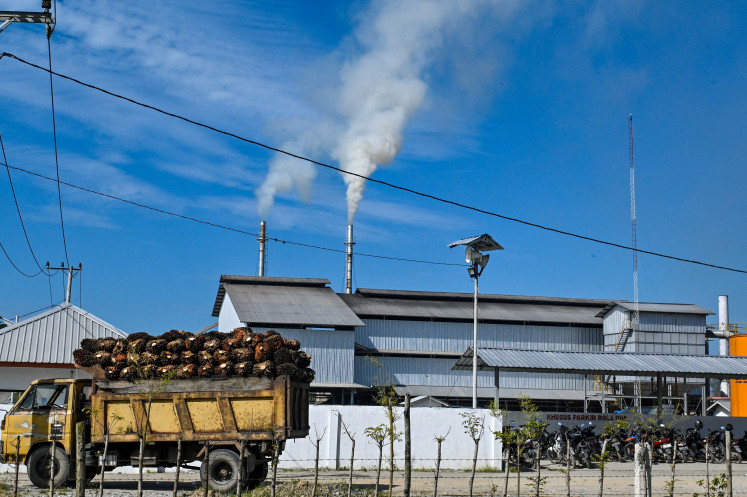Popular Reads
Top Results
Can't find what you're looking for?
View all search resultsPopular Reads
Top Results
Can't find what you're looking for?
View all search resultsPolitical parties flaunt similar economic platforms
The economic platforms promoted by the 12 political parties for the upcoming legislative election are by and large similar, with many promising such populist programs as empowering farmers, securing food and energy security, developing small businesses and building more infrastructure to improve connectivity across this vast archipelagic country
Change text size
Gift Premium Articles
to Anyone
T
he economic platforms promoted by the 12 political parties for the upcoming legislative election are by and large similar, with many promising such populist programs as empowering farmers, securing food and energy security, developing small businesses and building more infrastructure to improve connectivity across this vast archipelagic country.
Understandably, these economic platforms contain only macro-policy directives in normative terms. But then, as the saying goes, the devil is in the details, and all these policies, despite their nice-sounding rings, have yet to be implemented amid the harsh reality of current macroeconomic conditions.
It is encouraging to note, though, that factors such as institution building, bureaucratic reform, human resource quality (education), natural resources, environmental protection and technology, all of which are crucial to sustaining development in the long run, are not being overlooked.
The economic platforms of the major political parties also show a growing consensus that for enterprises to flourish and markets to function, there needs to be a set of enabling institutions ' a conducive legal environment and an effective supervisory and regulatory infrastructure.
Another positive note is that none of the parties have explicitly hit out at what many campaigners in the 2009 election attacked as neo-liberal economics.
It seems that more politicians now realize how idiotic it would be for them to continue bashing neo-liberalism. Indeed, how can economists perceive the nation's economy as neo-liberal when there are more than 140 state-owned companies, whose combined assets account for almost 40 percent of the country's gross domestic product (GDP)?
However, that does not mean that there were no bold or fresh ideas being promoted in the campaign speeches.
For example, the United Development Party (PPP), the country's oldest Islamic party, has announced a bold policy recommendation to reconstruct the state budget, double the fiscal-deficit ceiling and split the Finance Ministry into three independent ministries.
'We need to shift the state budget from cash basis to accrual basis to allow the government to post its potential revenue for the upcoming fiscal year and in the long run book potential revenue from the natural resources under its direct control,' said PPP deputy chairman Suharso Monoarfa.
Citing examples of future revenue, Suharso referred to mining royalties from proven mineral reserves, and the consolidation of potential net assets of state-owned enterprises (SOEs).
Beginning in the 2010 fiscal year, the government changed the annual budget cycle to a medium-term expenditure framework to help address investment needs for the medium term, thereby allowing for a multiyear project budget.
Suharso also stressed the need to change the law on state finances to allow for the doubling of fiscal deficit to 6 percent, of GDP, to raise the cap on government debt to a maximum of 49 percent of GDP and government debt-service ratio to 44 percent of export earnings.
But this fiscal expansion would need to be supported by a significant increase in the tax ratio (tax revenue against GDP) to as high as 20 percent from the current 13 percent, which was the lowest in the ASEAN region, he added.
In this context, Suharso suggested that the Finance Ministry should be split into three separate state institutions in charge of fiscal management (state finances), the treasury and tax administration, respectively.
'We already have a law on the treasury, yet the treasury comes under the jurisdiction of the Finance Ministry,' he told The Jakarta Post.
An independent tax authority, like the United States' Internal Revenue Service (IRS), would be more effective in conducting a more concerted tax campaign and more efficient tax administration, as it would not be held hostage by rigid assumptions on inflation and economic growth in setting tax receipt targets, according to Suharso.
He also recommended that the key assumptions for determining the state budget, which currently cover growth, inflation, the rupiah exchange rate, the price of oil and oil lifting, be expanded to include farmers' trade terms to measure the impact of development on their purchasing power.










